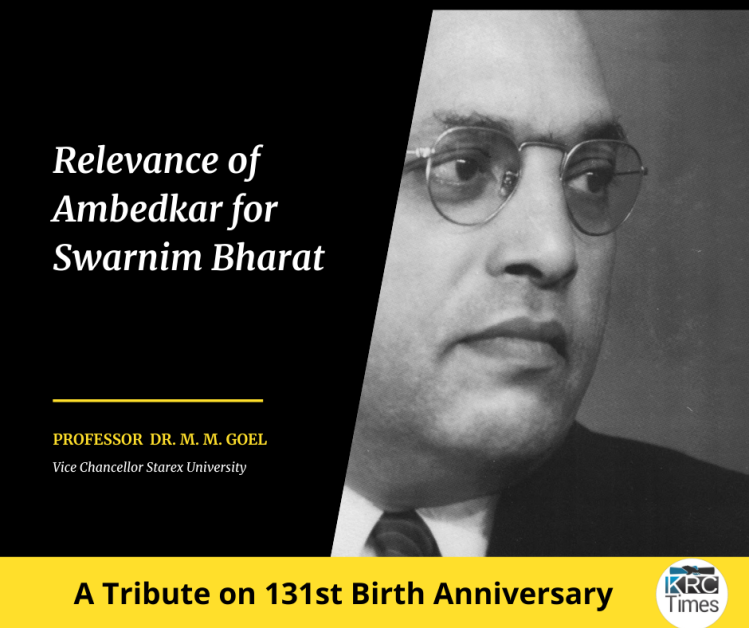In 1949, Ambedkar said that every Government should spend the resources garnered from the public not only according to rules, laws, and regulations but should also see that ‘faithfulness, wisdom and Economy’ are adhered to in the acts of expenditure by public authorities
 Dr. M. M. Goel
Dr. M. M. Goel

To pay a tribute to Bharat Ratan Dr. B.R Ambedkar- a jewel of India on the 131st birth anniversary being celebrated on 14th April 2022, we should know him as a professional economist more than a champion of scheduled castes and one of the authors of the constitution of India with relevance for any economy of the world including India with butterfly effect- a small change at one place in a complex system can have large effects elsewhere in the world to reduce if not remove the panic and fear ( false evidence appearing real) of the covid crisis which is evident in India also. For the bright future for Indians towards 2047 as Swarnim with solutions for all the ills prevailing in the society, we have to revisit the major contributions of Ambedkar.
1 As an architect of HRD in India
Bharat Ratan Dr. B .R. Ambedkar can be described as the architect of human resource development (HRD) in India, the scope and significance of which form the core analysis of the United Nations Development Programme (UNDP), formulating the case for human development strategy. In fact, Ambedkar’s social policies are a forerunner of the contemporary human development school of thought in public policy and deserve to be called the father of Human Resource Development in India.
The human development approach postulates Government intervention and regulation in the development of education, health, nutrition, protection of the environment, and the interests of the poor masses and weaker sections.
Ambedkar visualized a society where all social barriers between man and man were demolished where a man was measured by his worth and not by his birth, and where equality between man and woman was vigorously pursued. This meant that income inequalities caused by wealth and caste among the population had to be reduced. He emphasized the imperative necessity of uprooting the caste system which weakened Indian Society.
Ambedkar’s prime weapon was arming Depressed Classes with political power by virtue of the numerous safeguards incorporated in the Indian Constitution to improve their socio-economic, educational, and cultural conditions to augment their development from deprivation, social stigma, and suffering.
The identity and solidarity with which SCs are functioning and participating in the democratic elections is testimony to Ambedkar’s intellectual vision, and the safeguard introduced for securing social justice for the most depressed section of the Indian population. The SCs achieved substantial progress in the sphere of education and representation in public services in free India by virtue of the constitutional safeguards Ambedkar had proposed.
The Human Development Index (HDI) developed by UNDP in 1990 is an outstanding innovation for measuring the level of human development. It takes into account three basic elements of human well-being; longevity, knowledge, and the access to resources required for living measured by life expectancy, adult literacy, and mean years of schooling as well as real GDP per capita in purchasing power parity.
The HDI Ranking of India is 131 (HDI-0.647 and population1,406,631,776 ) out of 189 countries in the Human Development Report of 2021by by New York-based UNDP established in 1965.
Although Ambedkar’s prime concern was the uplift of the Depressed Classes, he anticipated the imperative of human development on a wider plane long ago. The current human development tide which endorses public social development is the fruit of Ambedkar’s endeavour. Ambedkar deserves to be known to the world as the father of HRD in India.
2 As an economist- 03 canons of public expenditure
Ambedkar deserves to be known to the World as an outstanding economist with recognition more than a noble prize in economics. The unique aspect of his scientific mind is evident in various memoranda and statements that he submitted to the Government of India from time to time are indicative of the fact that he had mastered the subject of economics to a great extent. He did his D.Sc from the London School of Economics.
To reduce panic and fear of the global financial crisis in any economy of the world, it would be relevant to adopt the canons of public expenditure advocated by Ambedkar. In 1949, Ambedkar said that every Government should spend the resources garnered from the public not only according to rules, laws, and regulations but should also see that ‘faithfulness, wisdom and Economy’ are adhered to in the acts of expenditure by public authorities.
2.1 cannon of faithfulness
The remarkable thing about Ambedkar’s canons of public expenditure is that they are ism-neutral. One can follow a policy of a large or small public sector and yet the principles behind these canons are applicable. First, the cannon of faithfulness, faith in this context is defined by the dictionary as a ‘duty or commitment to fulfill a trust, promise…’ Thus, it is necessary for the politicians in power and opposition to be faithful to the original intentions of the will of the people who voted for them to win the elections.
2.2 Wisdom of the professionals
Wisdom is the second canon of Ambedkar. A policy of the Government when executed may be faithful but may not be wise. While sagacity, prudence, and commonsense are the symptoms of a wise Government, it should also possess experience and knowledge of economics that can be practically applied in specific areas. In the context of a just utilization of public funds, the economic wisdom of the academic professional outside Delhi durbar becomes a paramount necessity.
2.3 cannon of economy
The third canon of the economy takes on a special meaning to achieving social well-being. The apparent faithfulness to the intentions and wisdom are not sufficient in themselves for public expenditure. The economy in public expenditure does not simply mean a low level of public spending but is the intelligent use of funds so that every rupee is beneficial worth its purchasing power which is otherwise declining day by day.
These canons of Ambedkar are sufficiently flexible so that expenditure can be related to the state of any economy. Ambedkar emphasized that the expenditure decision should closely relate to the specified objectives and the available resources, besides ensuring economy, efficiency, and effectiveness. The allocation of expenditure among competing demands and the manner of utilization fall within the domain of these canons.
Ambedkar canons can be used as a touchstone to see whether a particular item of expenditure is necessary or not. Every single decision should be assessed in terms of faithfulness to the will of the people; wisdom as provided by the professionals in the field, coupled with well-considered and honest judgment in execution.
Thus, Ambedkar’s canons of public expenditure are of great use for any economy of the world capable of facing any kind of global economic crisis. Let Ambedkar ( a known name but not as an economist) be known to the World as an outstanding economist deserving recognition more than a noble prize in economics as the father of HRD in India.
To change the mindset and uplift the consciousness of the people in India, we need to remember Ambedkar and celebrate his birth anniversary on April 14 more than an annual ritual as Satyakama Divas (Day to Seek the Truth). About a thousand years before the time of Mahabharata, Rishi Gautama addressed a child by the name Satyakama — one who seeks the truth— because of the Truth the child spoke. He was a son of an abused slave Dalit woman who did not know who fathered him. By accepting him, Rishi Gautama proclaimed to the world that such a childlike pure heart could only be that of a Brahmin. Satyakama grew up with him as a Brahmin student and is remembered forever for his scintillating contribution to Chhandogya Upanishad. Swarim Bharat calls for the wisdom of Ambedkar be understood and adopted by all of us.
* The writer is Vice Chancellor, Starex University, Gurugram and known as Founder Needonomics School of Thought www.starexuniversity.com, www.needonomics.com



